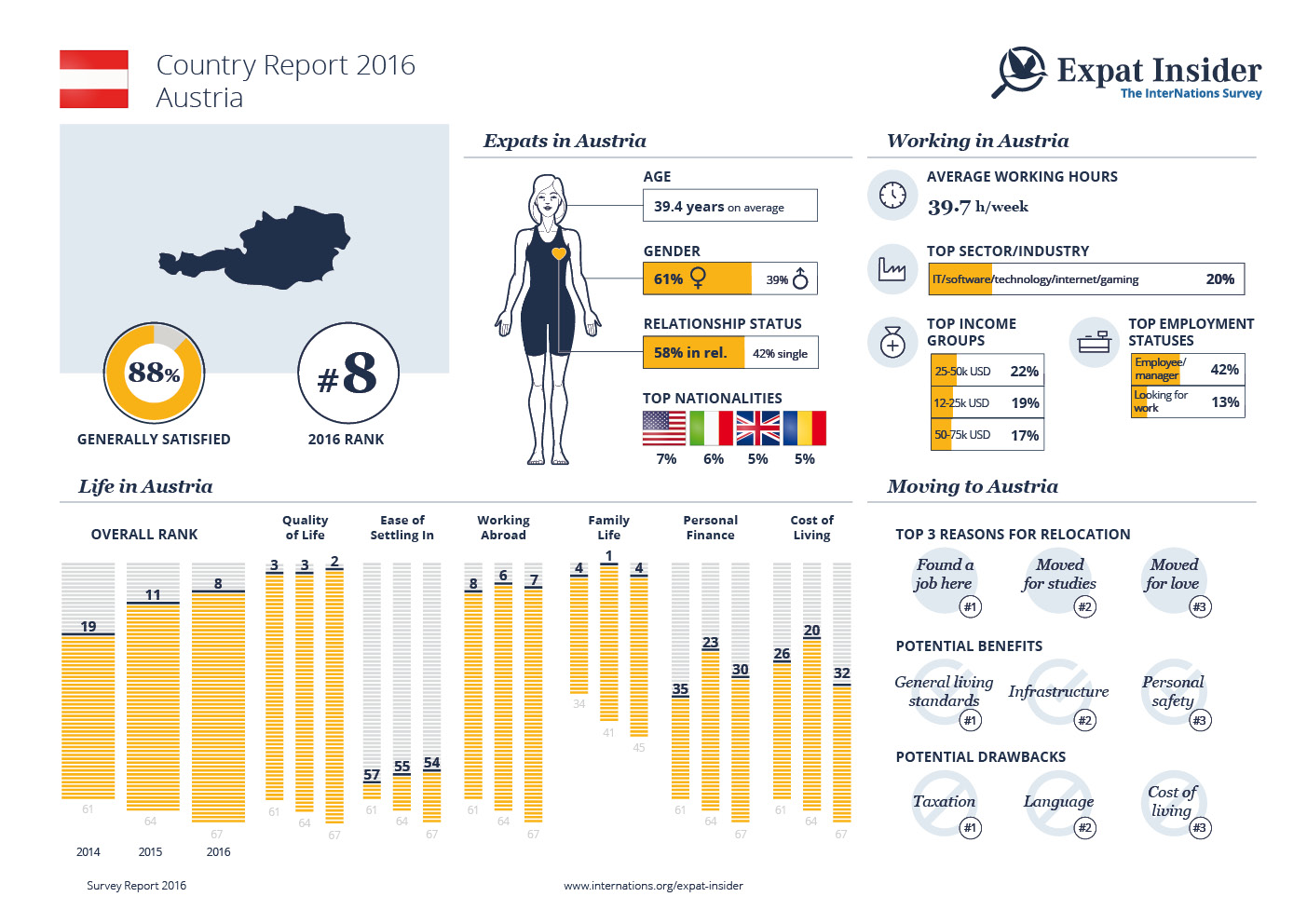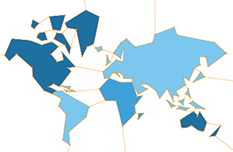Enjoying a Prosperous Life in Austria
- First in Health & Well-Being subcategory
- Over a quarter displeased with local attitude towards expats
- Almost a third plan to stay for life
- Down from first to fourth place in Family Life Index
In Fine Fettle
Austria rises up one rank to 2nd place out of 67 countries in the Quality of Life Index, lagging only behind Taiwan. This high ranking is mainly influenced by the Health & Well-Being subcategory, in which it ranks first worldwide. It also performs exceptionally well in the Travel & Transport subcategory, claiming third place.
Austria’s central location in Europe might explain why 92% of expats there appreciate the many opportunities to travel. The excellent transport infrastructure in Austria is rated favorably by 94% of the respondents. Personal safety, peacefulness, and political stability also contribute positively to the Quality of Life Index, with favorable ratings of 93%, 95%, and 83%, respectively. However, having said all this, Austria ranks an uninspiring 31st place in the Personal Happiness subcategory.
When it comes to healthcare, Austria is up there among the top rankings. More than four-fifths of expats (82%) are satisfied with the quality of medical care, while 79% think that healthcare is affordable. The quality of the environment is also rated positively, according to 96% of the respondents: maybe the fresh mountain air has contributed to this result? Those mountains also serve as destinations for leisure activities like winter sports or hiking, with 85% of expats satisfied with the available leisure options.
“I love the Alpine lifestyle, the culture, tradition, the friendliness of the locals, the feeling of safety and respect.”
Not the Warmest of Welcomes
One reason why the rankings for personal happiness are so mediocre, despite many other positive ratings, might be the difficulty of settling in. Austria reaches but a poor 54th place out of 67 in the Ease of Settling In Index. The perceived lack of friendliness of the locals, the trouble finding friends, and the difficulty of learning the local language are the main factors that bring Austria so far down in this category.
“Locals can be a little rejecting to foreigners especially if you do not speak German.”
Around half of the expats in Austria (51%) believe that the German language is difficult to learn, compared to 45% of the respondents around the world who think similarly about the local language of the country they now live in. Moreover, four out of nine expats say that making local friends is not easy, which could be connected to the level of friendliness of the locals towards foreign residents, as more than a quarter of the respondents (26%) are not happy with the local attitude towards expats. On the other hand, 61% state they feel at home in the local culture, while 58% have no problems with living in Austria without sufficient German language skills.
Safe and Secure
Austria ranks seventh in the Working Abroad Index. Indeed, many expats seem to proactively look for work in Austria before moving there: “I found a job here on my own” was the main reason for 14% of expats relocating there, with 42% of all respondents now working as an employee or manager. Eight in ten expats are happy with the state of the economy, and Austria also claims the seventh position in the Job Security subcategory as around two-thirds (67%) say they feel secure in their current job. It also ranks in the top ten in the Work-Life Balance subcategory, sitting in eighth place. Those figures might explain why almost a third of the expats (32%) want to possibly stay in Austria for life.
The length of the work week is seen positively by 73% of expats in Austria, and more than a quarter (26%) are very satisfied with it. The average Austrian work week (39.7 hours), as well as the average work week for full-time employees (43 hours), are shorter than the global average (41.4 and 44.6, respectively).
From a financial point of view, Austria seems to be about average, as it ranks 30th out of 67 countries in the Personal Finance Index, and 32nd in the Cost of Living Index. About one in five expats (21%) considers their disposable income insufficient to cover daily living expenses, but 73% are generally satisfied with their financial situation as a whole. Local taxes, however, seem to have been considered the biggest potential disadvantage prior to moving there, with more than a quarter (26%) responding negatively to the prospect.
Family First
In the Family Life Index, Austria has slipped from top spot to fourth place, but it still maintains high rankings in the Availability, and Costs of Childcare & Education subcategories claiming fourth and fifth place, respectively.
None of the expat parents in the Expat Insider 2016 survey are completely dissatisfied with their children’s well-being, while 87% are generally satisfied with the health and safety of their kids. In terms of overall satisfaction with family life in general, 35% say they are very satisfied.
The quality of education is also rated favorably by 85% of expat parents, which is 21 percentage points more than across the globe. Education is also easy to afford, according to 73% of the respondents, in addition to around two-thirds (68%) saying that there is a wide variety of education options.




